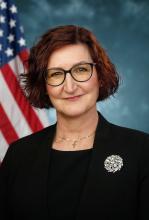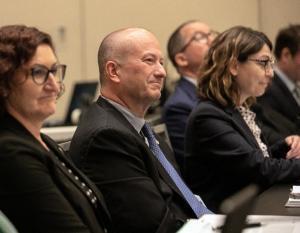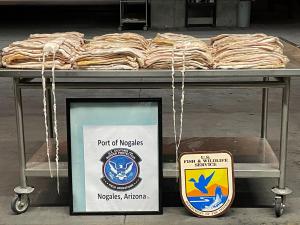-
In this Trade News Snapshot, I’d like to highlight a few milestones we’ve achieved in our ongoing efforts to combat forced labor and to keep the pace with and drive trade modernization.
On June 21, the Uyghur Forced Labor Prevention Act reached one year since implementation, and we have made significant progress ensuring fair and ethical supply chains, working tirelessly to eliminate goods made by forced labor from the U.S. commerce. Similarly, we celebrate the successful culmination of the 21st Century Customs Framework Task Force, who’s input will help usher in a new era of efficiency and security in international trade.
Through our collective efforts with industry, non-governmental organizations, U.S. federal agencies, and foreign governments, we have achieved breakthroughs in trade modernization and in upholding the integrity of our supply chains, paving the way for greater collaboration and innovation. The new continuing education requirements for customs brokers will keep customs brokers up to date on these breakthroughs and changes, facilitating increased trade compliance.
This momentum propels us forward as we look ahead to further accomplishments in the months to come. This work hasn’t been and can’t be done alone. Together, let us continue our unwavering dedication to shaping a fair, transparent and prosperous global trade landscape.
~ Executive Assistant Commissioner AnnMarie R. Highsmith
Contents
- EAC's Message
- I. Office of Trade Activity
- II. Outreach
- III. News You Can Use
- Article 1: U.S. Candidate Ian Saunders Elected Secretary General of the World Customs Organization
- Article 2: CBP officers, agriculture specialists intercept spider monkey at Gateway International Bridge
- Article 3: Philadelphia CBP officers seize nearly $15M in counterfeit currency
- Article 4: Second largest seizure of Totoaba swim bladders by Arizona CBP officers
- Trade Statistics
I. Office of Trade Activity
Uyghur Forced Labor Prevention Act implementation reaches one year milestone
June 21, 2023, marked one year since U.S. Customs and Border Protection (CBP) began implementing the Uyghur Forced Labor Prevention Act rebuttable presumption, leading U.S. government efforts to eliminate goods from the supply chain made with forced labor from the Xinjiang Uyghur Autonomous Region of China (XUAR).
“As we have diligently worked to implement the Uyghur Forced Labor Prevent Act over the past year, one of the greatest measures of success is an observable shift in supply chain practices to avoid sourcing from the Xinjiang Uyghur Autonomous Region,” said Senior Official Performing Duties of CBP Commissioner Troy A. Miller.
CBP has stopped nearly 4,300 shipments subject to UFLPA review or enforcement actions valued at over $1.3 billion and added new requirements and increased benefits for Customs Trade Partnership Against Terrorism members. CBP also launched an interactive public dashboard sharing regularly updated statistics on UFLPA enforcement efforts and has conducted more than 300 engagements with thousands of industry members, non-governmental organizations, Congress and the media to provide information and resources necessary to comply with the law.
Moving into the second year of UFLPA enforcement, CBP will continue to collaborate with trade associations, non-governmental organizations, U.S. federal agencies and foreign governments to globally combat forced labor and provide technical assistance to like-minded international partners. The agency will also support the Department of Homeland Security (DHS) and the interagency Forced Labor Enforcement Task Force (FLETF) to expand the UFLPA Entity List by pursuing a more robust and effective in-depth research, analysis, review and vetting of potential entities.
This is exactly what happened in June, when DHS announced that FLETF added two China-based companies. Effective June 12, 2023, goods produced by Xinjiang Zhongtai Chemical Co., Ltd. and Ninestar Corporation and eight of its Zhuhai-based subsidiaries are restricted from entering the United States because of their business practices that target members of persecuted groups, including Uyghur minorities in China.
The FLETF—which also includes the Office of the U.S. Trade Representative and the U.S. Departments of Labor, State, the Treasury, Justice and Commerce—will continue to revise the UFLPA Entity List. DHS will post revisions and publish the revised UFLPA Entity List as an appendix to a Federal Register notice.
“While we’re proud of the work we’ve done this past year, there is still a lot left to do,” said CBP Office of Trade Executive Assistant Commissioner AnnMarie R. Highsmith. “Our laws aren’t in place just to keep these goods out of the U.S. They exist to ensure that no good is ever made with forced labor in the first place. We have a long way to go to reach that reality, and you can bet that this will be a top priority for CBP until we do.”
CBP trade advisory committee convenes for quarterly public meeting
The June 14 Commercial Customs Operations Advisory Committee (COAC) meeting marked the conclusion of the 21st Century Customs Framework (21CCF) Task Force, which was created in 2021 to help inform CBP’s development of legislative trade modernization efforts. CBP’s 21CCF is an initiative that was launched in March 2019 to identify solutions to current and future trade challenges and modernization barriers.
Troy A. Miller, Senior Official Performing the Duties of CBP Commissioner, explained the unique perspective the 21CCF Task Force—which was comprised of both industry and government—brought to the discussion, validation and feedback on these trade modernization efforts. He said, “I want to thank the members of 21CCF of Task Force for their engagement and insight over the years. We look forward to continuing our engagement on these and other recommendations as new modernization ideas are formulated and Congress considers customs legislation.”
The COAC has voted in support of finalizing 18 of 24 legislative discussion drafts being developed by CBP, including certain industry-identified concepts that provide for clear facilitation benefits in statute.
COAC’s next public meeting will take place on September 20.
CBP introduces new customs broker education requirements
On June 23, CBP announced a new continuing education requirement for customs brokers, which will enhance compliant trade and protect against illicit trade entering U.S. commerce in an increasingly interconnected global trade environment. The new requirement will ensure brokers remain up to date on modern trade priorities and regulations. This is especially relevant as the volume and value of trade into the U.S. reached an all-time high in Fiscal Year 2022.
The new regulation requires individual customs brokers to earn 36 hours of continuing education every three years on evolving customs rules and related U.S. trade laws in order for customs brokers to maintain a valid license.
CBP will offer additional guidance on continuing education requirements for the upcoming 2024-2027 triennial status period and will provide information on course offerings through CBP and partner U.S. government agencies on a future date. CBP and partner government agencies will offer a variety of continuing education credits at no cost to customs brokers. Training and educational activities offered by a party other than CBP or a partner U.S. government agency will require approval by a CBP-selected accreditor.
CBP will continue to communicate updates on the new requirements, when brokers can begin pursuing continuing education credits and how many credits will be required for the upcoming 2024-2027 triennial period.
For more information and resources on the new regulation and the accreditation process, visit the Customs Brokers page on the CBP.gov website. To read the complete final rule, visit the Federal Register.
II. Outreach
EAC Highsmith encourages World Customs Organization council to strengthen gender equality and diversity in customs
On June 23, EAC Highsmith urged leaders of the 185 customs administrations that belong to the World Customs Organization (WCO) to accelerate efforts to achieve gender equality and diversity in customs.
“Our efforts to recruit a diverse workforce must begin now if we are to successfully navigate the massive growth of e-commerce, the harmful effects of climate change and other complex challenges,” said EAC Highsmith. “We must also eliminate the bureaucratic and cultural barriers in our organizations that prevent the retention and advancement of future leaders… and we must promote customs not as merely a job to be done, but as an exciting and fulfilling career for individuals from a variety of backgrounds and experiences.”
CBP was a leading contributor to the Gender Equality and Diversity Work Plan adopted by the WCO Council following EAC Highsmith’s remarks. At the national level, CBP continues to promote gender equality and diversity through its Diversity, Equity, Inclusion and Accessibility Strategy; the CBP Task Force for Women; and the agency’s commitment to the 30x30 Initiative, among other measures. CBP’s Office of Trade established a component-level Task Force for Women in 2022, which earned a DHS Champion of Equity Award for organizing communications campaigns, speaking engagements and networking events to raise awareness of gender bias in the workplace, women’s health and domestic abuse.
III. News You Can Use
U.S. Candidate Ian Saunders Elected Secretary General of the World Customs Organization
WASHINGTON – On June 24, Ian Saunders, the United States’ candidate and currently Deputy Assistant Secretary at the U.S. Department of Commerce’s International Trade Administration, was elected to become the next Secretary General of the WCO in Brussels, Belgium.
“On behalf of U.S. Customs and Border Protection, we are deeply proud and honored that Mr. Ian Saunders will represent the United States of America as the newest Secretary General of the World Customs Organization,” said Troy A. Miller, Senior Official Performing the Duties of CBP Commissioner.
“We look forward to Saunders’ leadership of this important body, where he has pledged to strike the balance between tradition and innovation, safety and facilitation, and national interests and global cooperation for the improvement of global customs practices. We have every confidence in his leadership of and commitment to our customs community.”
More information about Saunders’ vision for the WCO is available at on our website. Saunders’ speech to the WCO Council is also available on CBP.gov.
CBP officers, agriculture specialists intercept spider monkey at Gateway International Bridge
BROWNSVILLE, Texas – On June 14, CBP officers and agriculture specialists at the Gateway International Bridge intercepted a live spider monkey in a vehicle in a single enforcement action.
“Our frontline CBP officers and agriculture specialists maintained their vigilance and encountered a live spider monkey hidden under a blanket,” said Port Director Tater Ortiz, Brownsville Port of Entry. “Some people may view these animals as pets, but they are protected species and CBP remains committed to preventing the spread of animal diseases and preventing the exploitation of protected animals.”
Illegal wildlife trafficking is one of the most profitable natural resource crimes, and one of many natural resource crimes enforced by the CBP trade personnel.
Philadelphia CBP officers seize nearly $15M in counterfeit currency
PHILADELPHIA – CBP officers seized a combined nearly $14.4 million in various denominations of counterfeit U.S. currency in May.
The two most recent seizures occurred on May 26, when CBP officers seized two shipments that each contained more than $1.8 million of counterfeit currency. Previously, CBP officers seized more than $7.7 million of counterfeit currency on May 5 and nearly $3 million of counterfeit currency on May 2.
With the increased use of online marketplaces, unscrupulous people could potentially victimize inexperienced sellers or small businesses by using the counterfeit currency during fraudulent purchases or in other financial fraud crimes. Consumers and businesses can protect themselves from inadvertently receiving counterfeit currency by learning to quickly identify authentic Federal Reserve notes.
Second largest seizure of Totoaba swim bladders by Arizona CBP officers
TUSCON, Ariz. – CBP officers at the Area Port of Nogales seized 242 pounds of Convention on International Trade in Endangered Species of Wild Fauna and Flora and Endangered Species Act-protected Totoaba swim bladders with an estimated value of $2.7 million.
On April 13, 2023, CBP officers working at the Mariposa trade facility discovered 270 swim bladders of the endangered Totoaba fish, which were concealed within a commercial shipment of frozen fish fillets. CBP officers contacted U.S. Fish and Wildlife Service (USFWS) who took possession of the bladders. Preliminary DNA testing by USFWS indicates that these bladders are the endangered species Totoaba macdonaldi endemic to the Gulf of California in Mexico. This seizure is thought to be the second largest seizure of its kind in the U.S. and the largest Totoaba seizure in Arizona, to date.
Totoaba fish have been listed as an endangered species under the U.S. Endangered Species Act since 1979. The swim bladders of this species and other similar species worldwide are prized in Traditional Chinese Medicine and as an Asian cultural delicacy. Because the species is federally protected, in both the U.S. and Mexico, it is illegal to take, possess, transport, or sell Totoaba. In addition, the gill-net fishing methods used to catch the Totoaba have resulted in the co-demise of another endangered species in the Gulf of California, the Vaquita porpoise, Phocoena sinus.
Trade Statistics
Monthly Trade Statistics
In May 2023, CBP processed more than 2.8 million entry summaries valued at more than $273 billion, identifying estimated duties of nearly $6.9 billion to be collected by the U.S. government. Trade via the ocean environment accounted for more than 42 percent of the total import value, followed by air, truck and rail. CBP identified 460 entries valued at more than $197 million for further examination based on the suspected use of forced labor, and which may be subject to a Withhold Release Order, Forced Labor Finding, or the Uyghur Forced Labor Prevention Act’s rebuttable presumption prohibiting importation into the United States.
CBP seized nearly 1,980 shipments that contained counterfeit goods valued at more than $216 million. CBP also completed 26 audits that identified $1 million in duties and fees owed to the U.S. government for goods that had been improperly declared. CBP collected over $3.9 million of this identified revenue and from previous fiscal years’ assignments.







